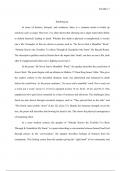Kershaw 1
Speaking up.
In times of distress, betrayal, and weakness, there is a common desire to bottle up
emotions such as anger. However, it is often shown that silencing one’s anger mutes their ability
to defend themself, leading to death. Whether this death is physical or metaphorical, it wrecks
one’s life. Examples of this are shown in poems such as “He Never Said a Mumblin’ Word,”
“Nobody Knows the Troubles I’ve Been Through & Scandalize My Name” By Bayard Rustin.
The descriptive qualities used by Rustin show the impact that ‘death’ can have on one’s life, both
after it’s happened and while one is fighting to prevent it.
In the poem “He Never Said a Mumblin’ Word,” the speaker describes the crucifixion of
Jesus Christ. The poem begins with an allusion to Mathew 27 from King James’ bible. This gives
the readers context to the described situation; Jesus was imprisoned and sentenced to death
before the crucifixion. As the poem continues, “he never said a mumblin’ word. Not a word, not
a word, not a word,” (Line 15, 15-16) is repeated in lines 15-16, 20-21, 25-26, and 30-31. This
emphasizes how quiet Jesus remained in a time of mockery and adversity. The challenges Jesus
faced are also shown through consistent imagery such as “They pierced him in the side,” and
“The blood came tricklin’ down” (Line 22), (Line 27). Despite his immense strength, never the
less, the poem still describes him bowing his head to die. This shows the physical consequences
of remaining silent.
In a more modern context, the speaker of “Nobody Knows the Troubles I’ve Been
Through & Scandalize My Name” is a poem describing a conversation between himself and God
through prayer. In the ‘conversation,’ the speaker describes feelings of betrayal from his
community. This feeling comes from the speaker giving his “right hand” to his community and
, Kershaw 2
receiving denial, scandal, and theft as a ‘thank you’ (line 15). Allegorically, the right hand
commonly represents strength and blessings, symbolizing how much the speaker has given to his
community. During the prayer, the speaker becomes aware of Jesus’ demonstration to avoid
scandal and suggests he should do the same. However, unlike the subject of “He Never Said a
Mumblin’ Word,” the speaker of “Nobody Knows the Troubles I’ve Been Through & Scandalize
My Name” is actively speaking out against this treatment. This is ironically shown through the
publishing of the poem and the poorly painted picture of his community. Repetition of phrases
such as “Do you call that a brother? No, No!” and “Do you call that a sister? No, No!”
emphasize the immorality of denial scandal and theft through God’s disapproval (Line 8, 8-9),
(Line 19, 19-20). This metaphorically shows the speaker’s desire to stay alive, even against
religious examples.
Similarly, the speaker of “Do Not Disregard Me” feels betrayed by his community, and
connections can be made between the two poems “Nobody Knows the Troubles I’ve Been
Through & Scandalize My Name” based on references to betrayal by Martin Luther King. This is
shown through statements such as “I met with Martin the other day” and “Do you call that a
preacher?” in “Nobody Knows the Troubles I’ve Been Through & Scandalize My Name” (line
25) (line 32). It can also be shown in the last line of “Do Not Disregard Me” when the speaker
says, “wasn’t this dream always our plan?” referencing Martin Luther King’s “I Had a Dream”
speech (line 22). Once again, the speaker defends his voice and presence as an influential leader
in the Civil Rights Movement. In this poem, it becomes evident that the Civil Rights group
rejects the speaker because of his sexuality. At first, he argues for his side to convince his
community to ‘take him back.’ This is especially shown in line three through the use of a
caesura. The caesura forces a pause between the cause of the fight and the word “alike,” this




